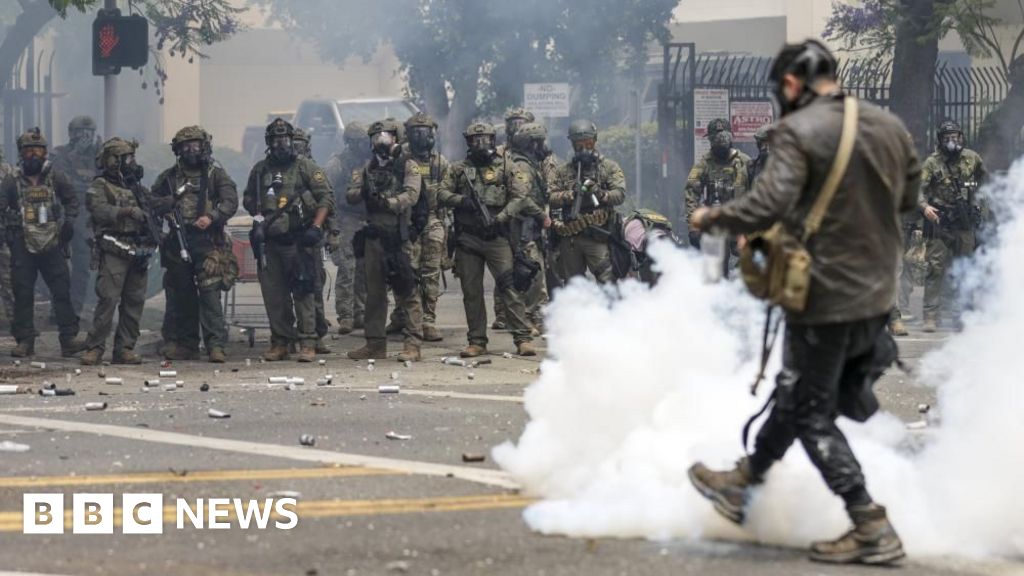ARTICLE AD BOX
Image source, AFP
Image caption, More than 16 million tonnes of rubbish make up Deonar's waste mountainThe "mountains of garbage" dotting India's cities will soon be replaced with waste treatment plants, Prime Minister Narendra Modi promised earlier this month. Author Saumya Roy reports from the country's oldest and tallest mountain of rubbish - some 18 storeys high - in the western coastal city of Mumbai.
Every morning, Farha Shaikh stands on top of a more-than-a-century-old rubbish mountain in Mumbai, waiting for garbage trucks to make their way up.
The 19-year-old waste picker has been scavenging through these heaps in the Deonar suburb for as long as she can remember.
From the gloopy trash, she usually picks up plastic bottles, glass and wire to sell in the city's thriving waste markets. But most of all she looks out for broken mobile phones.
Every few weeks, Farha finds a "dead" mobile phone in the trash. She digs into her meagre savings and gets it repaired. Once it flickers to life, she spends her evenings watching films, playing video games, texting and calling friends.
When the phone stops working again days or weeks later, Farha's connection with the world outside snaps again. She is back to working long days, collecting the remains of the city to resell - and looking for another phone to restore.
Image source, Saumya Roy
Image caption, The rubbish mountain in Mumbai's Deonar is 18 storeys highMore than 16 million tonnes of trash make up Deonar's rubbish mountains - eight of them spread over a 300-acre sprawl - that are said to be India's largest and oldest. Waste is piled as high as 120ft (36.5m). The sea forms the outer edge of the mountains and slums have been built into the sturdy heaps of rubbish.
The decomposing waste releases noxious gases such as methane, hydrogen sulfide and carbon monoxide. In 2016, it erupted in fires that burned for months and caused smoke in much of Mumbai. Rubbish fires at landfills contributed 11% of particulate matter, a major cause of air pollution in the city, according to a 2011 study by India's pollution regulator.
A 2020 study by a Delhi-based think tank, Centre for Science and Environment (CSE), found 3,159 such mountains containing 800 million tonnes of rubbish across India.
In Mumbai, a court case has been going on for 26 years to close down the Deonar grounds but the dumping of waste continues.
India's waste mountains have long vexed officials and politicians. On 1 October, Mr Modi announced nearly $13bn (£9.54bn) for a national cleanliness programme that would include setting up a number of sewage treatment plants to gradually replace open air rubbish dumps such as the one in Deonar.
But experts are sceptical. "While it has been done in smaller cities, it is hard to provide a remedy for waste mountains at this scale," says Siddharth Ghanshyam Singh, deputy program manager at CSE.
"There is an acknowledgement that this is a problem but we have accepted that if we are to live in big cities like Mumbai or Delhi, these garbage mountains come with it," says Dharmesh Shah, country co-ordinator for the Global Alliance for Incinerator Alternatives, a coalition of groups that advocate for reduced waste.
Image source, Reuters
Image caption, The rubbish mountains in Deonar caught fire in March 2016Since 2000, India has passed rules asking municipalities to process waste. But most states report only partial compliance, and there are not enough waste treatment plants.
Mumbai, India's commercial and entertainment capital and home to some 20 million people, has just one such plant. There are now plans for a waste-to-energy plant at Deonar.
Mr Modi said he expects the plan to create new, green jobs. But that worries waste pickers like Farha who have been doing this job all their lives.
It has become much harder for them to access the waste mountains after the fires in 2016. The municipality has increased security to prevent waste pickers from going in and lighting fires - the flames melt the lighter trash, bringing up metal that fetches high prices.
The waste pickers who manage to sneak in are often beaten, detained and sent back. But some bribe the guards or enter before the security patrols begin at daylight. So, little segregation happens at the grounds in Denoar now - instead, a lot of the waste is segregated in the city itself, and what arrives at Deonar has reduced over time.
Farha hasn't had a phone for months. She has to bribe guards at least 50 rupees ($0.67; £0.49) every day to get in and work at the Deonar grounds. To recover this, she even thought of picking through the rubbish that began arriving from the city's Covid hospital wards last year.
But her family asked her not to pick up the "harmful" Covid waste. So, she hangs close, watching pickers wear protective gear in the rain to keep collecting plastic to resell.
The city was sending new trash, and as they had for years, the mountains had to accommodate it and pickers had to collect and resell it.
"Hunger will kill us if not illness," Farha says.
Saumya Roy is a Mumbai-based journalist and author, most recently, of Mountain Tales: Love and Loss in the Municipality of Castaway Belonging (Profile Books/ Hachette India)

 3 years ago
112
3 years ago
112








 English (US) ·
English (US) ·